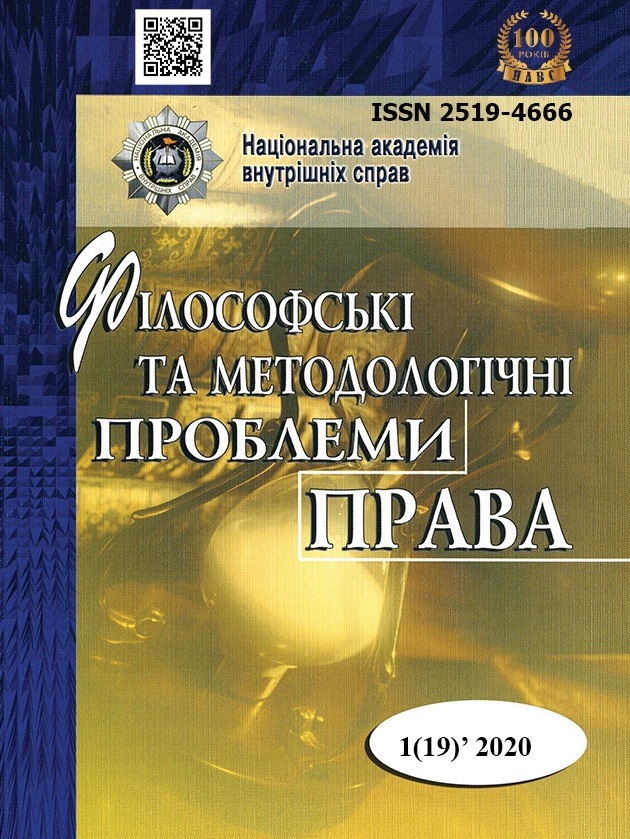Property and State in the context of Philosophical-Legal Reflections
Abstract
Purpose. The author seeks to investigate what kinds of property are acquired in the modern state. Modern society is difficult formation. Its development depends on the development of many components. The development of modern society is the result of development of political, legal, economic subsystems of society in the general understanding.
A considerable role in this development is played by property. The article is devoted to the problem of the property and state. The phenomenon of the property presentation philosophical category of property. The property is important factor of development society and freedom of human. The main task is researching of property, approaching to essence of this phenomenon. Methodology. Research methods are predefined by his character. Dialectical and system-structural methods, methods of logic, are used in the article foremost. Scientific novelty. Analyzing the property and state on the way of its genesis, development and becoming in the theoretical inheritance of philosophy, gives the analysis of multilevel of private property, as a philosophical category’s. Expedient will be marked that all patterns of ownership are analyzed in general through the prism of the private property. The basis of individual rights lies in the property. The property is not merely material acquisition – it is central to an individual’s assertion of identity and personality. The system of the private property establishes individuality and personality through contract and exchange. Contract establishes ownership through institutionalized norms of mutual respect of individual rights and obligations. Conclusions. The article analyzes the main conceptual approaches to understanding the nature of the property as a philosophical category. The author examines the most popular philosophical concept on property issues and their impact on the formation of public relations in the economic, social, legal, political and state of since.
Keywords: state; private property; philosophical category of property; property; ownership; human freedom; evolution.
Downloads
References
Balaban O. Genera and Species vs. Laws of Nature Two Epistemic Frameworks and their Respective Ideal Worlds. Studies in History and Philosophy of Science. 2020. Part A. doi: https://doi.org/10.1016/j.shpsa.2020.01.007.
Baum D. R., Cooper R., Lusk-Stover O. Regulating market entry of low-cost private schools in Sub-Saharan Africa: Towards a theory of private education regulation. International Journal of Educational Development. 2018. No. 60. P. 100–112. doi: 10.1016/j.ijedudev.2017.10.020.
Bolatto S., Naghavi A., Ottaviano G., Zajc K. Intellectual Property and the Organization of the Global Value Chain. University of Bologna, 2019.
Бутенко С. С. Питання власності в контексті теорії суспільного договору. Філософські та методологічні проблеми права. 2016. № 2. С. 189–197. URL: http://nbuv.gov.ua/UJRN/Fmpp_2016_2_18.
Бутенко С. С. Філософсько-правовий вимір власності як основи демократії : монографія. Київ : Кандиба Т. П., 2018. 188 с.
Череп О. Г., Кузнецова А. Є. Інтелектуальна власність та її вплив на конкурентоспроможність. Економічний простір. 2018. № 137. С. 180–189. doi: 10.30838/P.ES.2224.250918.190.238.
Демчишак Р. Інституційна сутність держави у світовій політичній думці. Humanitarian Vision. 2017. Vol 3. No. 2. P. 31–36. doi: https://doi.org/10.23939/shv2017.02.031.
Дубина И. Эволюция труда: от принуждения к творчеству. Епістемологічні дослідження в філософії, соціальних і політичних науках. 2018. № 1. С. 3–8. doi: https://doi.org/10.15421/341801.
Kaas L., Mellert J., Scholl A. Sovereign and private default risks over the business cycle. Journal of International Economics. 2020. Vol. 123. doi: https://doi.org/10.1016/j.jinteco.2020.103293.
Корольчук Л. Рушійні сили розвитку нової світової цивілізації: імператив соціального інтелекту. Humanitarian vision. 2018. Т. 4. № 2. С. 26–31. doi: https://doi.org/10.23939/shv2018.02.026.
Лунячек В. Е., Рубан Н. П., Тіманюк В. М., Фесенко Н. С., Черненко Ю. Ю. Освіта в сфері інтелектуальної власності як умова сталого розвитку держави. ScienceRise. Pedagogical Education. 2017. № 11. С. 4–9. doi: 10.15587/2519-4984.2017.116197.
Маркс К. До критики гегелівської філософії права : твори. Київ . Вид-во політ. літ. України, 1980. Т. 1. С. 207–324.
Петровський П. Проблеми та перспективи розвитку соціального інституту приватної власності в Україні. Ефективність державного управління. 2017. Вип. 3 (52). Ч. 1. С. 91–97.
doi: https://doi.org/10.33990/20704011.52.2017.149423.
Рахманов О. А. Соціальне сприйняття населенням приватних власників засобів виробництва в Україні. Український соціум. 2019. № 3 (70). С. 34–45. doi: https://doi.org/10.15407/socium2019.03.034.
Стовпець О. В. Інститут інтелектуальної власності в контексті соціально-філософського бачення проблеми співвідношення інформації, знань та інновацій. Філософські обрії. 2016. Вип. 35. С. 27–38. doi: https://doi.org/10.33989/2075-1443.2016.35.175101.
Abstract views: 310 PDF Downloads: 250
Copyright (c) 2020 Philosophical and Methodological Problems of Law

This work is licensed under a Creative Commons Attribution-NonCommercial-NoDerivatives 4.0 International License.
- Authors reserve the right to authorship of their own work and transfer to the magazine the right of the first publication of this work under the terms of the Creative Commons Attribution License, which allows other persons to freely distribute published work with mandatory reference to authors of the original work and the first publication of an article in this magazine.
- Authors have the right to enter into separate additional agreements on non-exclusive dissemination of the work in the form in which it was published in the journal (for example, to post an article in the institution's repository or to publish as part of a monograph), provided that the link to the first publication of the work in this journal is maintained.
- The journal's policy allows and encourages the posting of articles by authors on the Internet (for example, in electronic storehouses of institutions or on personal websites), both before the submission of this manuscript to the editorial office and during its editorial processing, as this contributes to the creation of a productive scientific discussion and positively affects the efficiency and dynamics of citing the published work.




